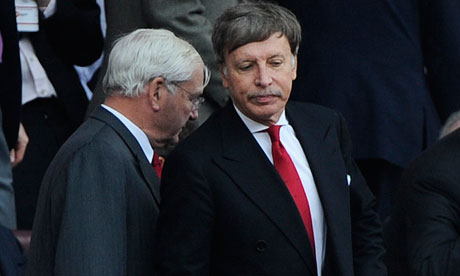Cesc Fábregas's pointed questioning of the "Arsenal way" and the sudden outbreak of fans querying the club's direction are coming, in a neat coincidence, just days after Arsenal's chairman, Peter Hill-Wood, sang his and the board's own praises as they sold their shares to Stan Kroenke.
Arsenal's "self-sustaining business model", as Hill-Wood and his fellow directors have come to call it, has been paraded to the parliamentary select committee's inquiry into football and to Uefa as the embodiment of virtue, compared to the plutocrat-subsidised loss-making at Chelsea and Manchester City. In a nutshell it means that Arsenal spend what they earn, from the 60,361-seat Emirates Stadium and other income they make, and the directors or shareholders do not put their own money in.
It is the sensible way for football clubs to be run and what Uefa requires in its financial fair-play rules, but there are some serious problems with the fairness of the self-congratulatory Arsenal "model". Over almost 30 years not one director or shareholder of Arsenal has put a penny into the club itself, while they have made vast personal millions for themselves out of selling their Arsenal shares.
Hill-Wood last week said that as directors, "protecting the ethos and spirit" of the club was "a key responsibility", so they were selling to Kroenke because they are confident he will be a "safe custodian". Secure that they were doing their duty, Hill-Wood banked £4.7m for his shares, Lady Nina Bracewell-Smith £116m and Danny Fiszman, who was terminally ill by then and has since died, £117m for his family.
None of that money is going back into Arsenal, whether to buy and fund the wages of some senior experienced players Fábregas argues they desperately need – that would be contrary to the "self-sustaining model" – or to keep ticket prices the right side of extortionate. It is all for the custodians to keep.
Arsenal's self-sustaining model now apparently requires prices to rise again, 6.5%, at the stadium that already has the most expensive tickets in the Premier League – and therefore the world. Arsenal Supporters' Trust, managing creditably to campaign for the club's soul while diplomatically seeking an influence, is challenging what these price rises are to be spent on, while other fans are simply, angrily, objecting to forking out more.
Arsène Wenger's resistance to signing the kind of colonels Fábregas is calling for is said to be due to the manager's own philosophical insistence that he wants to win things with kids. Hill-Wood and his fellow board members, all senior citizens, appear to have left that to the manager over the years, using the club's money to pay down the stadium debt rather than buy players. While sensible, of course, to reduce the debt, that also made the trophy-less club, and the directors' shares, more attractive financially for Kroenke to buy.
Arsenal's status as the club whose way set an example to all does deserve to be challenged. It never was a "sustainable model", which other clubs could follow, if a 60,000-seat stadium, in the nation's richest catchment area – London and the south-east – is what football now requires to be competitive.
Now, though, the model appears to be to hit the fans with another 6.5% ticket-price rise, while the directors, who put no money into the club, pat themselves on the back as they put multiple millions into their own bank accounts.{jcomments on}
 HABERLER & MAKALELER
HABERLER & MAKALELER 


































